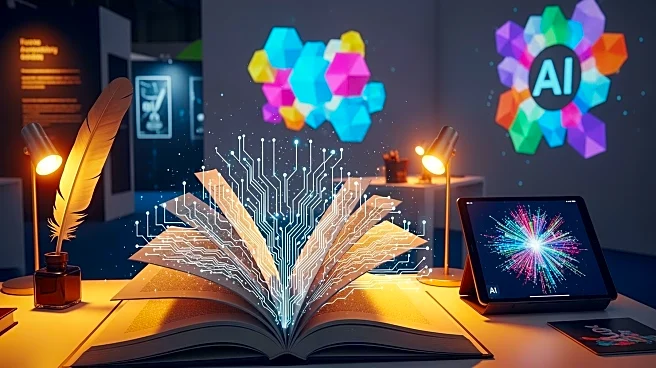What's Happening?
At the Frankfurt Book Fair 2025, author and advertising executive Nadim Sadek introduced the concept of AI as 'allied intelligence' to enhance creative expression. Sadek's book, 'Quiver, Don’t Quake,'
explores AI's potential to unlock universal creativity by acting as a partner rather than a competitor. He coined the term 'panthropic' to describe AI as a reservoir of human knowledge and emotions, advocating for AI's role in fostering creativity through dialogue. Sadek argues that AI should be seen as a tool to articulate creative thoughts, rather than a threat, and encourages publishers to adopt AI to enhance their content creation processes.
Why It's Important?
The discussion at the Frankfurt Book Fair highlights the evolving role of AI in creative industries, emphasizing collaboration over competition. Sadek's perspective challenges the narrative of AI as a threat, suggesting it can democratize creativity by making it accessible to all. This approach could transform publishing, encouraging major houses to develop AI tools to compete in content creation. The emphasis on creativity over efficiency suggests a shift in how industries might leverage AI, potentially leading to more innovative and diverse outputs. This could impact how content is produced and consumed, influencing cultural and economic landscapes.
What's Next?
As AI continues to integrate into creative industries, publishers may increasingly adopt AI tools to enhance their offerings. The dialogue around AI's role in creativity could lead to new collaborations between tech companies and creative professionals, fostering innovation. Sadek's conversation with Bloomsbury CEO Nigel Newton at the fair may spark further discussions on how AI can be embraced in publishing. The industry's response to these ideas could shape future strategies, potentially leading to new business models and creative processes that leverage AI's capabilities.
Beyond the Headlines
Sadek's concept of 'panthropic' AI challenges traditional views of artificial intelligence, suggesting a more holistic integration into human creativity. This perspective raises ethical questions about AI's role in cultural production and its potential to redefine authorship and originality. The idea of AI as a partner rather than a tool could lead to shifts in how creative work is valued and attributed, impacting intellectual property rights and the economics of creative industries.










